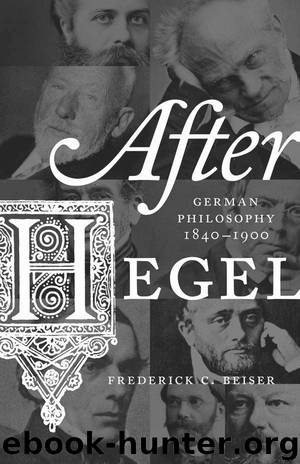After Hegel by Beiser Frederick C

Author:Beiser, Frederick C.
Language: eng
Format: epub
Publisher: Princeton University Press
Published: 2014-02-20T16:00:00+00:00
6. DILTHEY ON THE VIRTUES AND VICES OF NATURALISM
No less than Eduard von Hartmann, Wilhelm Dilthey saw Du Bois-Reymond’s lecture as a threat to his greatest ambitions. Ever since the 1860s Dilthey had been struggling to formulate the distinctive logic of the social and historical sciences.32 He believed that there could and should be a science of the social and historical world just as there already was one of the natural world. Given that there had been so much progress in the the study of history, law, and anthropology since the beginning of the century, the time was now ripe attempt to develop a logic and methodology of the social and historical sciences. But Du Bois-Reymond’s lecture threw cold water on such hopes. If the argument of his lecture were correct, it would be impossible for there to be anything like a science of society and history. According to that argument, the paradigm of explanation is mechanical; and that paradigm cannot explain the first level of consciousness, sensation, let alone the more complex phenomena of history and society.
It comes as no surprise, therefore, that in his first major attempt to define the logic of the historical and social sciences, his 1883 Einleitung in die Geisteswissenschaften, Dilthey took issue with Du Bois-Reymond. In the second section of his book Dilthey countered Du Bois-Reymond’s argument by finding an equivocation in his concept of the limits of natural science (9–13). The concept of the limits of science is ambiguous, Dilthey held. On the one hand, it refers to the incommensurability between two kinds of concepts, the concepts with which we describe consciousness and those with which we explain the physical world. These concepts are incommensurable because the former concepts cannot be reduced to the latter. On the other hand, the limits of science refers to the inexplicable, to what cannot be subsumed under natural laws or explained according to the mechanical paradigm. The problem with Du Bois-Reymond’s argument, Dilthey claims, is that it confuses these issues. Because our concepts about mental life and consciousness are not reducible to those we use to describe the physical world, Du Bois-Reymond concludes that mental life and consciousness cannot be explained according to natural laws. But this is a non sequitur. It is still possible to provide a naturalistic explanation of mental life even if our discourse about it is incommensurable with those of the physical sciences (12).
Dilthey’s point against Du Bois-Reymond is that he confuses a difference in perspective or explanation with a difference in reality itself. Because discourse about mental life is different from the laws with which we explain the natural world, he assumes that the phenomena of mental life cannot be explained according to those laws. A logical difference is reified and made into an ontological barrier. Dilthey later uses the old language of absolute idealism to explain his point about different standpoints (15). We can begin from inner experience and construct the entire world as a condition of self-consciousness, which was the standpoint of transcendental philosophy.
Download
This site does not store any files on its server. We only index and link to content provided by other sites. Please contact the content providers to delete copyright contents if any and email us, we'll remove relevant links or contents immediately.
The remains of the day by Kazuo Ishiguro(8997)
Tools of Titans by Timothy Ferriss(8393)
Giovanni's Room by James Baldwin(7345)
The Black Swan by Nassim Nicholas Taleb(7128)
Inner Engineering: A Yogi's Guide to Joy by Sadhguru(6792)
The Way of Zen by Alan W. Watts(6614)
The Power of Now: A Guide to Spiritual Enlightenment by Eckhart Tolle(5781)
Asking the Right Questions: A Guide to Critical Thinking by M. Neil Browne & Stuart M. Keeley(5771)
The Six Wives Of Henry VIII (WOMEN IN HISTORY) by Fraser Antonia(5514)
Astrophysics for People in a Hurry by Neil DeGrasse Tyson(5189)
Housekeeping by Marilynne Robinson(4445)
12 Rules for Life by Jordan B. Peterson(4303)
Ikigai by Héctor García & Francesc Miralles(4273)
Double Down (Diary of a Wimpy Kid Book 11) by Jeff Kinney(4268)
The Ethical Slut by Janet W. Hardy(4251)
Skin in the Game by Nassim Nicholas Taleb(4248)
The Art of Happiness by The Dalai Lama(4130)
Skin in the Game: Hidden Asymmetries in Daily Life by Nassim Nicholas Taleb(4004)
Walking by Henry David Thoreau(3959)
